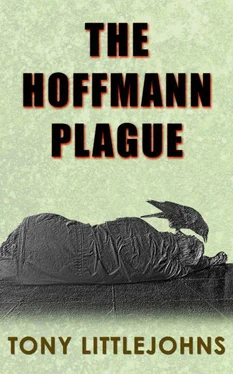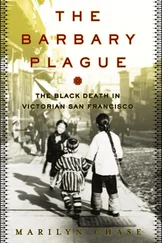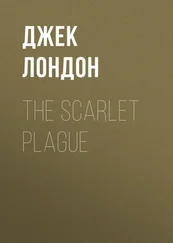When he’d stopped crying, he turned on the TV to see if there was any news. Most stations were already off-air. The BBC still had some broadcasts, but even they were breaking down rapidly. There was some pre-recorded newsreel footage of looting, mayhem and terror all around the country, and then the broadcasts had stopped abruptly. He’d tried the local radio stations and it was the same with them.
Although Bexhill Hospital didn’t have an A&E unit it was swamped nonetheless. Hundreds died there before it shut down; overwhelmed by the number of infected and many of the staff dead or dying. Most people died at home, either by themselves or with loved-ones, and many were too weak to go out again once the infection took hold. A certain percentage, inevitably, avoided the plague’s clutches due to being housebound by old age, illness or disability. Once the utilities had failed, though, and unable to fend for themselves effectively, they soon perished from a combination of dehydration, starvation and weakness. The vast majority were just completely caught out by the rapid escalation of events, the high rate of infection and the incredulity of it all, with not enough time to prepare adequately.
Ten days or so after his last conversation with his brother he had become sick himself. The streets had become eerily quiet, with hardly any sounds of people or vehicles. The only regular sounds were the plaintive cries of seagulls, as always, and he’d thought it should be safe to go out wearing a mask. The streets were empty, and the two people he saw while on his way to the supermarket were in a great hurry and looked desperate. Aldi was deserted; the doors were wedged open and the aisles strewn with trampled produce from people panic-buying. There were no staff members anywhere in the shop and many shelves were bare. He managed to find a few bottles of cooking oil and some other items, including – miraculously – two bottles of whisky lying on their sides on the top shelf. He then walked down to Sainsbury’s and it was the same story there. He found a few useful items, along with some tobacco and cigarettes, and put them in his rucksack. As he was leaving, a woman turned the corner and ran into him, dislodging his mask. She was red in the face and breathing heavily, her hair matted with sweat. She didn’t stop or say anything, but ran off, coughing.
By evening of the third day he was sweating profusely and sneezing. He had a terrible headache, was aching all over and his breathing was laboured. It felt like someone was kneeling on his chest. He coughed in the bathroom and saw blood on the wall, and then vomited. Shit! This was it. He didn’t know what to do and panicked, before realising there was nothing he could do, so he got a bottle and a glass from the drinks cupboard and sank down onto the sofa in despair. He had an air of resignation to it as there was no one he could go to for help or to talk with about it. He picked up his mobile phone and tried some numbers but there was an automated message every time saying it had not been possible to connect his call and to try again later. He didn’t even bother cooking an evening meal, but drank a lot of whisky and spent the evening thinking back over his forty-two years, frequently in tears. He remembered things he’d done, friends and family, women he’d loved but never got to be with. Around midnight he passed out and collapsed on the sofa.
When he’d awoken it was light, and he assumed it was the following day. He was amazed that he’d woken at all and was still alive. He tried to get up, but was so weak that he fell back down again. His head hurt and there was vomit on the floor next to the sofa, mixed with blood. He struggled to the bathroom and was sick again, then went into the kitchen, leaning heavily on the surfaces for support. He was desperately thirsty and opened the taps, but only a trickle came out. He opened a bottle of water and drank a pint straight down, then made up two sachets of Dioralyte rehydration powder and drank them. After that he made some strong coffee with lots of sugar and some salt. He had terrible hunger pangs, but didn’t feel like eating anything yet.
He sat on the stool and looked at his watch: he didn’t know why – what did it matter what the time was? He noticed the date window, but couldn’t focus properly to read it, so he found his reading glasses and looked again. He did a classic double-take. What the hell ? It was six days since he’d passed out, as far as he could recall. He’d lost six whole days! No wonder he was weak. He guessed he’d slipped into some kind of coma… He had no idea what had happened, but he was alive. He didn’t know whether he had a natural immunity to the plague bacterium, or whether he just had a great immune system that had fought the disease. They’d said the mortality rate was approaching a hundred percent, which meant there was a small chance that a few people might survive.
It took over a month to regain his health properly, during which he ate as healthily as his food supply allowed, resting frequently and also taking vitamin supplements. As he felt vigour returning he exercised to regain strength. Meanwhile, in turn, all services and utilities had failed completely. There was no sound at all from the surrounding streets.
When he felt strong enough he worked outside in his small courtyard. His cordless drill’s batteries still had full charge, so he rigged-up a shelter to enable him to cook outside with wood that he would collect, thus saving valuable fuel. The containers he’d put out to collect rainwater were full, so he put lids on them. In the third week of his recuperation he found an envelope stuck through his letterbox that he’d missed. It was a letter from the guy upstairs, saying that he and his partner were infected and were going to his mum’s to spend their remaining time with her. There was a key to their house and he told him to help himself to anything useful. He ended with the lines Ain’t life a bitch! Good luck . Curious, he went upstairs and let himself in. He found that Paul had also stockpiled supplies and, importantly, there were many packs of bottled water, plus many boxes of dried and canned food.
For the next few weeks he became aimless and depressed, unwilling and scared to go out and face things; but eventually he’d snapped out of it and ventured out as his food supply diminished.
The next morning, during breakfast, he was undecided on his next course of action. He wanted to go back to the angling club to pick up the oars and fishing tackle, then find a suitable boat for fixing the rowlocks to so he could get out on the sea to fish. While that would be good start to becoming self-sufficient in terms of fresh food – especially protein – he realised that he needed to get properly organised. There was no point fetching and arranging things for his future survival without first finding himself somewhere more suitable to live. There was no more room in the flat, anyway.
He also wanted to try out his bike with the new paniers, as he needed to start collecting water instead of using up any more of his precious bottled supply. But the same consideration applied to that, too: until he found a new home he didn’t really need the bike for water collection, as he could walk to Egerton Park for it, which wouldn’t be much of a problem. He could forage for shellfish for protein while he was still in his flat, and maybe fish from the beach if he needed to. And, with his new-found knowledge from the plants he’d identified, he could have fresh greens. Therefore, the most important thing, in his mind, was to find a new place to live first, and then start organising things for his future. These were important concepts for survival, and who would have thought that, in the twenty-first century, he would have to think of such things?
Читать дальше












